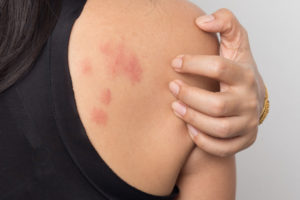There is much that is still unknown about COVID-19 and its symptoms. While many people experience the typical symptoms of cough, fatigue, and loss of taste or smell, there are other symptoms that appear in some COVID patients. Physicians are beginning to see urticaria, also known as hives, and other rashes in COVID patients. In many cases, hives present themselves as the first symptom. Urticaria is associated with a relatively mild form of the disease. They may look like any of the following:
- Patchy rash
- Itchy bumps
- Round, pinpoint spots on the skin
- Large patch with several smaller ones
- A lace-like pattern on the skin
- Flat spots and raised bumps that join together

These hives may itch and be in one or multiple spots on the body. Reports suggest that the rash typically lasts between two and twelve days, with most people having it for about a week.
In a recent case published in BMJ Journals, a 54-year-old woman tested positive for COVID-19 and experienced shortness of breath for one day along with generalized weakness and a rash associated with itching and a burning sensation that progressively worsened for three days prior to entering the emergency room. Her hives appeared on many parts of her body. After treatment, the hives resolved within 48 hours.
While this patient’s hives disappeared within days, some hives due to COVID may last for months. You may also experience swelling. If the swelling is causing breathing problems, you should seek medical attention immediately. While the exact cause of hives in COVID-19 patients is not yet known, some experts believe that it may be related to an overactive immune response to the virus.
Blisters
Some COVID-19 patients have reported developing blisters on their fingers and toes, which is believed to be a result of blood clots caused by the virus. These blisters are usually accompanied by other symptoms such as fever, cough, and difficulty breathing. It is important to seek medical advice if you have COVID-19 and develop blisters, as they could be a sign of a more serious underlying condition.
Diagnosing COVID and Hives
As with any medical condition, you should not try to diagnose yourself. Hives may be a symptom of COVID-19 or a number of other things. Diagnosis of hives typically involves a physical examination and medical history review by a doctor. During the physical exam, the doctor will look at the location, size, and shape of the hives to help make a diagnosis. The doctor may also ask about symptoms and potential triggers, such as exposure to allergens, medications, or recent illnesses. In some cases, further testing may be necessary, such as blood tests or skin biopsy, to rule out other underlying conditions and confirm the diagnosis. The doctor may also refer the patient to an allergist for specialized testing and treatment.
If you do experience hives randomly, you can get tested for COVID. If a negative result returns, your hives could be caused by allergies. Many allergens cause hives, so it’s important to get an allergy test for a quick diagnosis. At NY Allergy & Sinus Centers, we can diagnose your hives in minutes.
Treating COVID and Hives
The treatment of COVID-19 depends on the severity of the illness and underlying health conditions. The following are some common treatments for COVID-19:
- Supportive care: This may include oxygen therapy for patients with low oxygen levels, hydration, and pain management.
- Antiviral drugs: Some antiviral drugs, such as remdesivir, have been authorized for emergency use by regulatory agencies for the treatment of COVID-19.
- Corticosteroids: Corticosteroids, such as dexamethasone, may be used to reduce inflammation in severe cases of COVID-19.
- Monoclonal antibodies: Monoclonal antibodies, such as bamlanivimab and casirivimab with imdevimab, may be used to prevent or treat COVID-19, especially in high-risk patients.
- Vaccination: COVID-19 vaccination is a critical component of the response to the pandemic, as it can help prevent severe illness, hospitalization, and death.
The treatment plan will be tailored to the individual patient based on their medical history, underlying health conditions, and the severity of their illness. It is important to follow the doctor’s instructions and seek prompt medical attention if symptoms worsen.
If your hives are due to allergies, there are many ways we can help.
The following are some common treatments for hives:
- Antihistamines: Over-the-counter or prescription antihistamines can help relieve itching and reduce the appearance of hives.
- Corticosteroids: Topical or oral corticosteroids can be used to reduce inflammation and swelling.
- Avoid triggers: Identifying and avoiding triggers, such as certain foods or medications, can help prevent hives from recurring.
- Topical creams: Calamine lotion or hydrocortisone cream can be applied to the affected skin to relieve itching.
- Cool compresses: Placing a cool, damp cloth on the affected skin can help relieve itching and reduce swelling.
At NY Allergy & Sinus Centers, your treatment plan will be tailored to your individual symptoms and may involve a combination of these therapies. Book an appointment online to see how we can help heal your hives fast.
Meet the Physician Collaborator
Dr. Grossman is a physician specializing in both Pediatric and Adult Allergy & Immunology. He earned his medical degree at the Albert Einstein College of Medicine. He completed his residency in Pediatrics at Montefiore Medical Center, where he also completed his Allergy and Immunology Fellowship. He is board-certified in Pediatrics as well as Allergy and Immunology and is a member of the American Academy of Allergy and Immunology (AAAAI), the American College of Allergy, Asthma, and Immunology (ACAAI), and the New York Allergy and Asthma Society (NYAAS). Dr. Grossman treats an array of allergic and immunological disorders, with interests in food allergy, asthma, perennial, and seasonal allergies. He enjoys treating both children and adults and looks forward to providing them with outstanding, individualized care. Book an appointment with him or any of our other board-certified allergists by calling (212) 686-6321 or schedule an appointment online.

